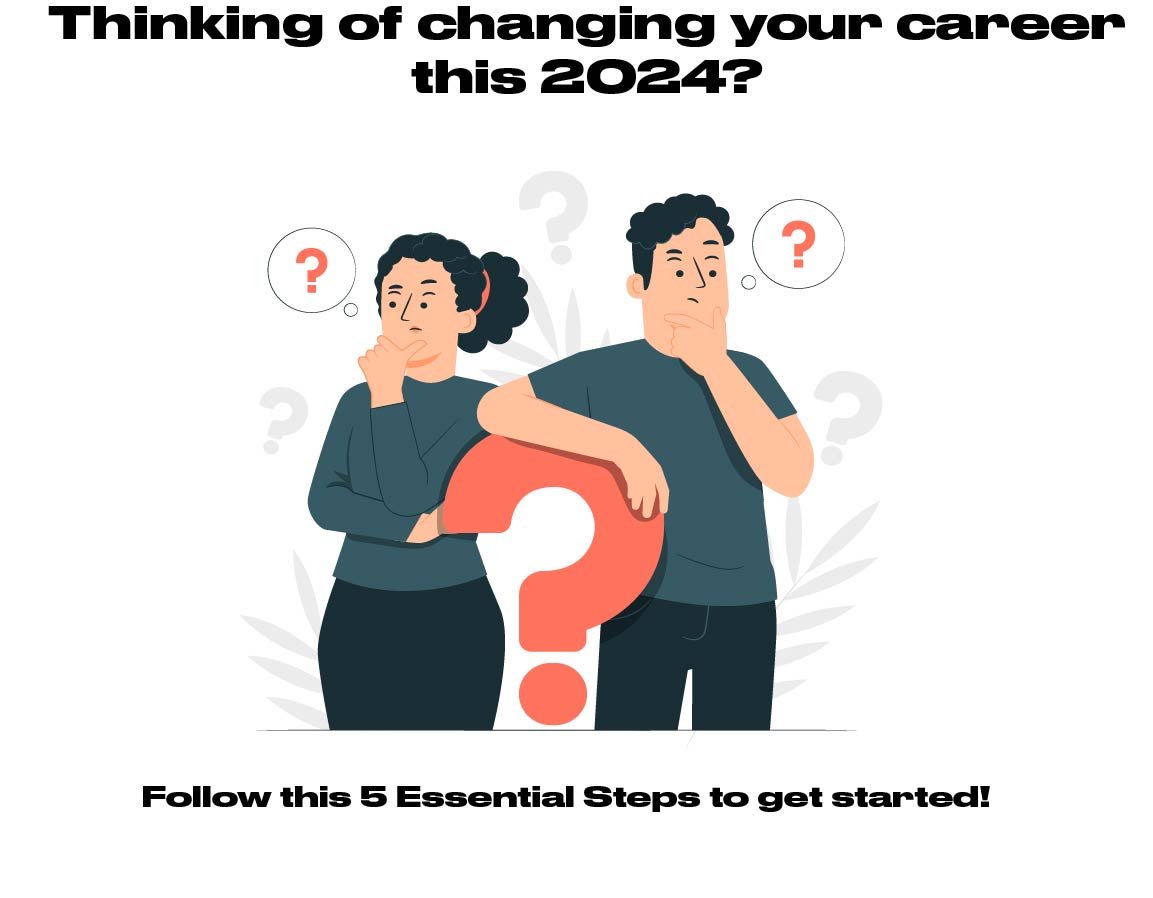Are you contemplating a job change in 2024? It’s a significant decision that requires careful planning and preparation. Whether you’re a recent graduate entering the workforce or an experienced professional seeking a change, these five essential steps will guide you toward a successful career transition.

Before diving into job listings, take a moment to understand your motivations. Ask yourself:
Reflecting on these questions helps clarify your career goals and ensures your next move aligns with your personal and professional aspirations.
The job market is constantly evolving, especially in today’s digital age. Research industries and roles that align with your skills and interests. Consider factors like job demand, growth potential, and required qualifications.
Utilise resources like Industry reports, Online forums, and Networking events to gain insights into various career paths.
These are comprehensive documents or publications that provide analysis, research findings, and forecasts related to a specific industry. By reading industry reports, you can learn about trends, challenges, growth opportunities, key players, and future outlooks of sectors you’re interested in. This information is invaluable for making informed decisions about your career path, identifying areas of demand, and understanding what skills or knowledge you might need to succeed.
These digital platforms allow individuals to discuss, share experiences, and ask questions about a wide range of topics, including careers example:
Linkedin forums the professional networking site, hosts groups for virtually every industry and career interest. These groups allow professionals to connect, share articles, discuss industry trends, and post job opportunities.
Reddit has numerous subreddits dedicated to specific industries, careers, and professional development, such as ( r/nzjobs, r/newzealand, r/Careerguidance, and r/TheCareerAcademy ) These communities offer a place to ask questions, share experiences, and get advice from a broad range of perspectives.
Quora is a question-and-answer platform where people can ask questions on a wide range of topics, including career advice, industry insights, and specific job roles. Experts and experienced professionals often provide detailed answers.
Industry-Specific Forums: Many industries have their own dedicated forums or message boards. These can range from technology (such as GitHub Discussions for developers) to finance (such as Wall Street Oasis for investment banking and finance professionals
Participating in or even just reading discussions on online forums can offer real-world insights into various professions, advice from experienced professionals, and tips on navigating career challenges. Forums can be a rich source of peer support and guidance, helping you to explore different career options from the perspective of those already working in those fields.
These events, whether in-person or virtual, provide opportunities to meet industry professionals, recruiters, and peers with similar interests. Networking events can help you build professional relationships, learn about job opportunities, and gain insider knowledge about the industries you’re interested in. Through conversations with attendees, you can uncover details about different career paths that are not easily found in written resources, such as personal experiences, company cultures, and unadvertised job openings.
Visit sites like Eventbrite , Meetup, and The Networkers’ official websites for more information on events and to explore further networking opportunities.
Before making a leap, try out your desired career path through:
Your resume and LinkedIn profile are your first impressions to potential employers. Update them to reflect your new career direction:
Finally, approach your job search strategically:
Changing careers is a journey of self-discovery, learning, and growth. By following these steps, you’re setting yourself up for a successful transition into a fulfilling new career. Remember, it’s about finding a path that aligns with your passions, skills, and life goals. At The Career Academy NZ, we’re here to support you every step of the way in your career journey.
Embarking on a new career path can be exciting but also daunting. If you find yourself seeking more tailored advice after reading these steps, we’re here to help.
Contact one of our expert career advisors for a free consultation (Call 0800 342 829) and start your 2024 career journey with confidence!
Our advisors are equipped with the knowledge and experience to guide you through every aspect of your career transition, ensuring you make informed decisions that align with your personal and professional aspirations.
©2024 The Career Academy is Internationally Approved and Registered with the International Approval and Registration Centre. Our courses are recognised by industry and employers throughout New Zealand and Internationally. We are an ICOES accredited centre and all the programs we offer are therefore accredited. The Career Academy is a Xero Partner, an MYOB Approved Education Partner, an IAB Accredited Training Provider and an AAT Approved Training Provider(Provider code: OO01000627). We are a registered service provider with NZTE. The Career Academy Limited is a New Zealand Registered Company (Company Number: 1922762)
FOR